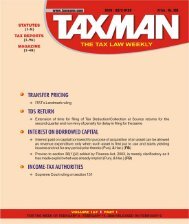CPT V24P7-Art1 (Content).pmd - Taxmann
CPT V24P7-Art1 (Content).pmd - Taxmann
CPT V24P7-Art1 (Content).pmd - Taxmann
You also want an ePaper? Increase the reach of your titles
YUMPU automatically turns print PDFs into web optimized ePapers that Google loves.
in the above judgment observed that the appellate<br />
authority has all the powers which the original<br />
authority has in deciding the question before<br />
it subject to the restrictions and limitations<br />
prescribed by statutory provisions. The powers<br />
of the CIT(A) are co-terminus with the powers<br />
of the A.O. while deciding any issue before<br />
him. He can call for additional evidence, can<br />
do the enquiries or direct the A.O. to carry<br />
out requisite enquiries through remand.<br />
Therefore, there cannot be any restrictions or<br />
limitations on his powers to entertain new<br />
claim or new ground. He has to be only satisfied<br />
that the ground or claim raised before him<br />
was bona fide and it could not be raised earlier<br />
for good reasons.<br />
The power of the first appellate authority is<br />
derived from the statute wherein section 251<br />
empowers him to confirm, reduce, enhance or<br />
annul the assessment and to pass such orders<br />
in the appeal as he thinks fit. The Explanation<br />
to section 251 empowers him to “consider and<br />
decide any matter arising out of the proceedings in<br />
which the order appealed against was passed<br />
notwithstanding that such matter was not raised<br />
before him by the appellant.” A new claim of<br />
deduction or exemption would affect the taxable<br />
income and, accordingly, tax liability of the<br />
assessee which is the core matter in the<br />
proceedings before the A.O. and, therefore, even<br />
if a matter is not raised before him CIT(A), he<br />
can consider and decide any issue arising out<br />
of the assessment proceedings. Even though<br />
Hon’ble M.P. High Court in CIT v. Nirbheram<br />
Deluram [1981] 5 Taxman 84 was of the view<br />
that the proceedings before the A.O. are limited<br />
to the matters expressly or impliedly raised by<br />
the assessee and by the A.O. and so considered<br />
by him, meaning thereby that new issues not<br />
raised by the assessee or by the A.O. will not<br />
be part of the proceedings before the A.O., but<br />
this view was reversed by the Hon’ble Apex<br />
Court in CIT v. Nirbheram Deluram [1997] 91<br />
Taxman 181 by following the decision in Jute<br />
Corporation of India Ltd. (supra) wherein the<br />
Apex Court reiterated that the first appellate<br />
authority has wide powers “co-terminus with<br />
that of the Income-tax Officer”, so that, “he can<br />
do what the Income-tax Officer can do and can<br />
also direct him to do what he failed to do”.<br />
Such vast powers are conceded to the first<br />
appellate authority for the reason that the<br />
Department has no right of appeal against the<br />
assessment order and, in the course of scrutiny<br />
of appeal filed by the assessee, the appellate<br />
authority can see whether, in the interests of<br />
the Revenue, the tax has to be enhanced? The<br />
only limitation which seems to be placed on<br />
the powers of the first appellate authority is<br />
that he cannot travel beyond the record to find<br />
out new source of income. If he is able to<br />
identify new source of income from the record<br />
of the A.O. or his own record of appeal, it<br />
would be within his jurisdiction to consider<br />
new source of income. After considering the<br />
decisions in Nirbheram Deluram (supra); CIT v.<br />
Kanpur Coal Syndicate [1964] 53 ITR 225 (SC);<br />
CIT v. Shapoorji Pallonji Mistry [1962] 44 ITR<br />
891 (SC) and CIT v. Raj Bahadur Hardutroy Motilal<br />
Chamaria [1967] 66 ITR 443 (SC) the Hon’ble<br />
Delhi High Court in CIT v. Union Tyres [1999]<br />
107 Taxman 447 laid down the principle that :<br />
“The first appellate authority is invested<br />
with very wide powers under section<br />
251(1)(a) of the Act and once an assessment<br />
order is brought before the authority, his<br />
competence is not restricted to examining<br />
only those aspects of the assessment about<br />
which the assessee makes a grievance<br />
and ranges over the whole assessment to<br />
correct the Assessing Officer not only with<br />
regard to a matter raised by the assessee<br />
in appeal but also with regard to any<br />
other matter which has been considered<br />
by the Assessing Officer and determined<br />
in the course of assessment. However,<br />
there is a solitary but significant limitation<br />
to the power of revision, viz., that it is<br />
not open to the Appellate Assistant<br />
Commissioner to introduce in the<br />
assessment a new source of income and<br />
the assessment has to be confined to those<br />
items of income which were the subjectmatter<br />
of original assessment”.<br />
August 1 to 15, 2012 u TAXMANN’S CORPORATE PROFESSIONALS TODAY u Vol. 24 u 55<br />
675











![“FORM NO. 3CEB [See rule 10E] Report from an ... - Taxmann](https://img.yumpu.com/45480232/1/190x245/form-no-3ceb-see-rule-10e-report-from-an-taxmann.jpg?quality=85)





